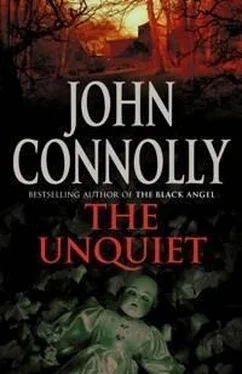But these items were merely distractions, although everything about them suggested that they had been treasured at some time by their owners. Instead, my attention was drawn to the mirror. Its reflective surface had been severely damaged, seemingly by fire or some other great heat, so that the wooden backing was visible at the heart. The glass had warped, the edges stained with brown and black, and yet it had not cracked and the wood behind was not charred. The heat that had been applied to cause such damage was so intense that the mirror had simply melted beneath it, yet the backboard had been left unmarked.
I reached out to touch it, then stopped. I had seen this mirror before, and suddenly I knew who it was that was manipulating Frank Merrick. Something twisted in my stomach, and I felt a surge of nausea. I might even have spoken, but the words would have made no sense. Images flashed through my mind, memories of a house-
“This is not a house. This is a home.”
Symbols on a wall in a dwelling long abandoned, revealed only when the paper began to come away and loll in the hallway like a series of great tongues. A man in a threadbare coat, with stains on his trousers and the sole coming away from the base of one of his shoes, demanding payment of a debt owed by another long believed dead.
“This is an old and wicked world.”
And a small, gilded mirror, held in this man’s nicotine-stained fingers, an image reflected in it of a howling figure that might have been myself or might have been another.
“He was damned, and his soul is forfeit…”
Angel appeared beside me, looking blankly at the items in the closet.
“What is it?” he asked.
“It’s a collection,” I said.
He moved closer and seemed on the verge of picking up the toy car. I raised my hand.
“Don’t touch it. Don’t touch any of it. We need to get out of here. Now.”
And then he saw the mirror. “What happened to-”
“It’s from the Grady house,” I said.
He backed away in disgust, then looked over his shoulder in expectation of seeing the man who had brought the mirror to this place suddenly emerge from his hiding place, like one of the hibernating spiders in the rooms above alerted by the coming of spring’s first insects.
“Aw, you got to be fucking kidding,” said Angel. “Why is nothing ever normal?”
I closed the closet doors, the key still vibrating in the lock as I turned it, sealing away the collection once again. We climbed up from the cellar, slid the bolt across, and restored the padlock. Then we departed from that place. We left no signs of our trespass, and as Angel locked the back door behind us the house seemed just as it did when we had arrived.
But I felt it was to no avail.
He would know we had been there.
The Collector would know, and he would come.
The journey back to Scarborough was conducted in near silence. Both Angel and Louis had been in the Grady house. They knew what had taken place there, and they knew how it had ended.
John Grady was a child killer in Maine, and his house had been unoccupied for many years after his death. Thinking about it now, perhaps “unoccupied” was the wrong word. “Dormant” might have been more appropriate, for something had remained in the Grady house, some trace of the man who had given to it his name. At least, that is how it seemed to me, although it might just as easily have been shadows and fumes, the miasma of its history, and the remembrance of the lives lost there mingling to create phantasms in my brain.
But I was not the only one who suspected that something had secured itself in the Grady house. The Collector had appeared, a raggedy man with yellow nails, asking only that he be given permission to take a souvenir from the house: a mirror, and nothing more. He did not seem willing, or able, to enter the house himself, and I believed that at least one man, a minor thug named Chris Tierney, had died at the Collector’s hands after he had dared to get in this strange, sinister man’s way. But the permission that the Collector sought had not been mine to grant, and when he saw that he would not be given what he wanted, he had taken it anyway, leaving me bleeding on the ground.
And the last thing that I saw as I lay there, my skull blazing with pain from the force of the Collector’s blow, was the image of John Grady trapped behind the glass of the mirror that the Collector had taken, screaming impotently as justice came for him at last.
Now that same mirror, charred and warped, lay beneath a deserted house, reflecting an assemblage of unrelated objects, tokens of other lives, of justice meted out by that emaciated figure. In the past, he had signed his name at least once as “Kushiel”: a black joke, the name stolen from hell’s jailer, but nevertheless a hint as to his nature, or what he believed to be his nature. I felt certain that each of the items in that old closet represented a life taken, a debt paid in some way. I recalled the stink that hung over the pit in the cellar. I should make the call, I thought. I should bring the cops down on him. But what could I say? That I smelled blood, yet there was no blood to be seen? That there was a closet of trinkets in the cellar, but with only a first name here, a date there, to connect them to their original owners?
And what were you doing down in the cellar, sir? You do know that breaking and entering is a crime, don’t you?
And there was another matter to be considered. I had encountered individuals in the past who were as dangerous as the Collector. Their natures, only some of which I could begin to explain or understand, had been corrupted, and they were capable of great evil. But the Collector was different. He was motivated by something other than a desire to inflict pain. He appeared to occupy a space beyond conventional morality, engaged in work that had no time for concepts of due process, of law or mercy. In his mind, those he sought had already been judged. He was merely executing the sentence. He was like a surgeon removing cancerous growths from the body, excising them with precision and casting the diseased parts into the fire.
Now he was manipulating Merrick, using him to draw unknown individuals from the shadows so that they might reveal themselves to him. Merrick had been in the house, if only for a time: the discarded pack and the rotting chicken told me as much. The Collector also smoked, but his tastes were a little more exotic than American Spirit. Through Eldritch, he had provided Merrick with a car, probably funds too, and also a place in which to stay, a base from which to operate but almost certainly with an injunction attached stipulating that he was not to enter any locked part of the house. And even if Merrick had disobeyed and made his way down to the cellar, would those items in the closet have meant anything to him? They would merely have appeared to be a random jumble, an eccentric amalgam of disparate items held in an old closet that vibrated to the touch, tucked into a corner of a cellar that reeked faintly of old, rotting things.
It was clear now that the Collector was looking for someone connected to Daniel Clay although, if Eldritch was to be believed, not Clay himself. There could be only one answer: he wanted those who had preyed on Clay’s patients, the men who, if I was right, were responsible for whatever had happened to Lucy Merrick. So Eldritch had been engaged to ensure that Frank Merrick was freed and pointed in the right direction, but Merrick was not the kind of man to report his every move back to an ancient lawyer in a paper-filled office. He wanted revenge, and the Collector must have known that, at some point, Merrick would move entirely beyond his control. He would have to be shadowed, his movements revealed, so that any information he gleaned would automatically be shared with the one who had freed him to conduct his search. And when the men he sought at last made their move, then the Collector would be waiting, for there was a debt to be paid.
Читать дальше












